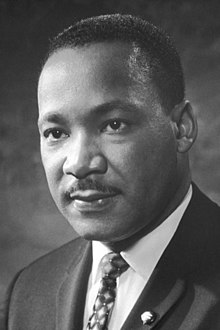
Back Кинг, Мартин Лиутер Abkhazian Martin Luther King jr. Afrikaans Martin Luther King ALS ዶ/ር ማርቲን ሉተር ኪንግ Amharic Martin Luther King AMI Martin Luther King, Jr. AN Martin Luther King Jr ANN मार्टिन लूथर किंग ANP مارتن لوثر كينغ الابن Arabic مارتين لوثر كينج ARZ
Martin Luther King Jr. | |
|---|---|
 King in 1964 | |
| 1st President of the Southern Christian Leadership Conference | |
| In office January 10, 1957 – April 4, 1968 | |
| Preceded by | Position established |
| Succeeded by | Ralph Abernathy |
| Personal details | |
| Born | Michael King Jr. January 15, 1929 Atlanta, Georgia, U.S. |
| Died | April 4, 1968 (aged 39) Memphis, Tennessee, U.S. |
| Cause of death | Assassination by gunshot |
| Resting place | Martin Luther King Jr. National Historical Park |
| Spouse(s) | |
| Children | |
| Parents | |
| Relatives |
|
| Education | |
| Occupation |
|
| Monuments | Full list |
| Movement | |
| Awards |
|
| Signature | |
Martin Luther King, Jr. (born Michael King, Jr.; January 15, 1929 – April 4, 1968)[1] was an American pastor, activist, humanitarian, and leader in the Civil Rights Movement. He was best known for improving civil rights by using nonviolent civil disobedience, based on his Christian beliefs. Because he was both a Ph.D. and a pastor, King was sometimes called the Reverend Doctor Martin Luther King Jr. (abbreviation: the Rev. Dr. King), or just Dr King.[a] He is also known by his initials MLK. He was the pastor of the Ebenezer Baptist Church in Atlanta, Georgia.
Martin Luther King Jr. worked hard to make people understand that not only black people but that all races should always be treated equally to white people. He gave speeches to encourage African Americans to protest without using violence.
Led by Dr. King and others, many African Americans used nonviolent, peaceful strategies to fight for their civil rights. These strategies included sit-ins, boycotts, and protest marches. Often, they were attacked by white police officers or people who did not want African Americans to have more rights. However, no matter how badly they were attacked, Dr. King and his followers never fought back.
King also helped to organize the 1963 March on Washington, where he delivered his "I Have a Dream" speech. The next year, he won the Nobel Peace Prize.
King fought for equal rights from the start of the Montgomery Bus Boycott in 1955 until he was murdered by James Earl Ray in April 1968.
- ↑ Kirk, John A. (2016). "Did Martin Luther King Achieve His Life's Dream?". BBC Online. British Broadcasting Company, Inc. Archived from the original on March 12, 2016. Retrieved February 29, 2016.
<ref group=lower-alpha> tags or {{efn}} templates on this page, but the references will not show without a {{reflist|group=lower-alpha}} template or {{notelist}} template (see the help page).